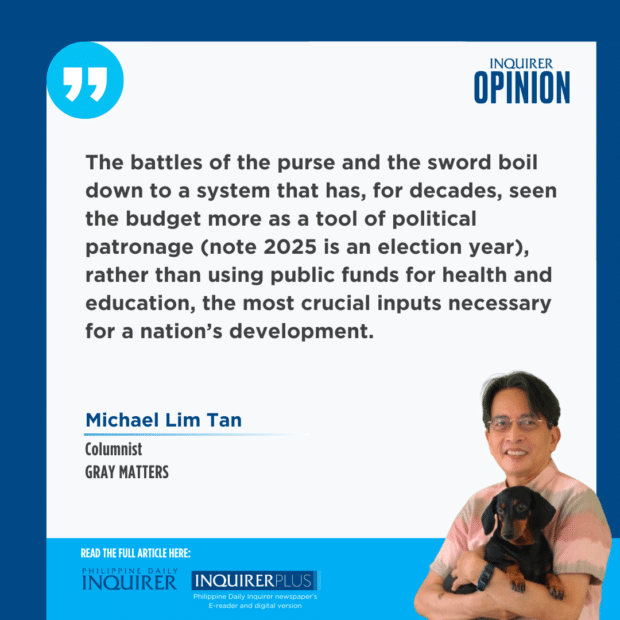The purse and the sword

The separation of powers in the main branches of government is a hallmark of democracies, allowing checks and balances. I recall learning about the three branches—the executive, the legislative, and the judicial—as early as high school, to be repeated in college although by then, martial law had been declared in the Philippines and the separation of powers was more often breached than respected.
These days, we once again witness frequent violations of the separation of powers. I’ve written about how congressional hearings have become more like court proceedings, complete with legislators ordering detention in jails of witnesses charged with contempt.
A twist to the political theater has been Congress’ passing of the 2025 national budget that has been strongly criticized, clearly carrying the imprint of the political intramurals involving the legislature (Congress) and the executive, or at least a faction of the executive, the Office of the Vice President.
It was the early fathers of the American Revolution, notably James Madison, who crafted a constitution that clearly defined the branches and powers of the government. Madison also borrowed a metaphor from a New Testament passage (Luke 22:36) where Jesus advises the Apostles about the need to have a purse and a sword, the terms used in governance to refer to the legislature (the purse) and the executive (the sword).
The Philippines borrowed from the United States model, our legislature is supposed to have the power of the purse, passing laws to raise money (taxes) and propose a national budget to allocate public funds by departments and by functions (e.g., salaries, capital expenditures).
The 2025 budget has upset many, especially because of the cutbacks in education through slashes in the Department of Education (DepEd), the Commission on Higher Education or CHEd, and state universities and colleges, including the University of the Philippines. Also sent to the guillotine was the budget for the Philippine Health Insurance Corp. (PhilHealth), the national health insurance agency, with zero subsidies.
It is not clear who were behind these cutbacks, but what seems to have happened is that our legislators, who are supposed to mainly control the purse, have continued their monthslong forays into controlling the sword, using the national budget cutbacks as a punitive measure.
Slashing the DepEd budget seems to be a punitive action directed against the former education secretary, Sara Duterte. But why punish Duterte by taking away funds from the DepEd, which she no longer heads? The current secretary, former senator Sonny Angara, has spoken out against the cutbacks.
Then there’s the PhilHealth massacre, “justified” by the argument that PhilHealth has reserve funds anyway. Not coincidentally, the executive branch tried to transfer so-called surplus funds out of PhilHealth a few weeks ago, but the Supreme Court temporarily blocked the transfers when challenged by citizens’ initiatives, from health professionals and from legislators themselves, particularly from Makabayan and other progressive parties.
Throughout our history, from the 20th century and into the 21st, our executive branch has intervened, wielding both the purse and the sword. The “History of the University of the Philippines,” with a recently released volume 3, makes a good Christmas gift not just for educators but for students of history and politics. In the book, you find well-documented accounts of our presidents, from the imperial President Manuel Quezon, to Ferdinand Marcos Sr. wielding martial law, to the most recent presidents who had their ways of influencing the legislators, smuggling swords, well, daggers into the purses. University of the Philippines (UP) was always the most vulnerable because its constituents were so vocal and critical of the government.
Targeting DepEd, which manages primary and secondary institutions, is so despicable when you see how our politicians constantly whine about our being at the bottom of the cellar when it comes to international evaluations of school performance (e.g., Programme for International Student Assessment) and yet allowing a mutilation of the DepEd budget.
We forget there was a time, up to the 1950s, when public schools excelled. We still see excellence in science high schools, UP, and other state universities and colleges, but the 2025 budget does not augur well for the future of education.
The PhilHealth massacre is another matter, actually illegal, because various sin tax laws on tobacco, alcoholic drinks, and sugar-sweetened beverages specifically allocate a large percentage of sin tax collections to health care.
The battles of the purse and the sword boil down to a system that has, for decades, seen the budget more as a tool of political patronage (note 2025 is an election year), rather than using public funds for health and education, the most crucial inputs necessary for a nation’s development.
—————–
mtan@inquirer.com.ph




















